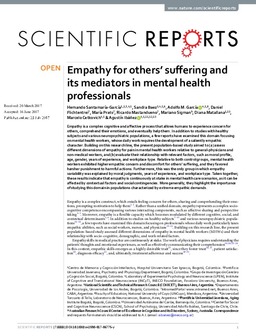Mostrar el registro sencillo del ítem
Empathy for others’ suffering and its mediators in mental health professionals
| dc.rights.license | https://creativecommons.org/licenses/by/4.0/ | es_AR |
| dc.contributor.author | Santamaría-García, Hernando | es_AR |
| dc.contributor.author | Baez, Sandra | es_AR |
| dc.contributor.author | García, Adolfo M. | es_AR |
| dc.contributor.author | Flichtentrei, Daniel | es_AR |
| dc.contributor.author | Prats, María | es_AR |
| dc.contributor.author | Mastandueno, Ricardo | es_AR |
| dc.contributor.author | Sigman, Mariano | es_AR |
| dc.contributor.author | Matallana, Diana | es_AR |
| dc.contributor.author | Cetkovich, Marcelo | es_AR |
| dc.contributor.author | Ibáñez, Agustín | es_AR |
| dc.date.accessioned | 2018-07-20T15:24:56Z | |
| dc.date.available | 2018-07-20T15:24:56Z | |
| dc.date.issued | 2017-07-25 | |
| dc.identifier | doi: 10.1038/s41598-017-06775-y | es_AR |
| dc.identifier.uri | https://doi.org/10.1038/s41598-017-06775-y | es_AR |
| dc.identifier.uri | https://repositorio.utdt.edu/handle/20.500.13098/11060 | |
| dc.description.abstract | Empathy is a complex cognitive and affective process that allows humans to experience concern for others, comprehend their emotions, and eventually help them. In addition to studies with healthy subjects and various neuropsychiatric populations, a few reports have examined this domain focusing on mental health workers, whose daily work requires the development of a saliently empathic character. Building on this research line, the present population-based study aimed to (a) assess different dimensions of empathy for pain in mental health workers relative to general-physicians and non-medical workers; and (b) evaluate their relationship with relevant factors, such as moral profile, age, gender, years of experience, and workplace type. Relative to both control groups, mental health workers exhibited higher empathic concern and discomfort for others’ suffering, and they favored harsher punishment to harmful actions. Furthermore, this was the only group in which empathy variability was explained by moral judgments, years of experience, and workplace type. Taken together, these results indicate that empathy is continuously at stake in mental health care scenarios, as it can be affected by contextual factors and social contingencies. More generally, they highlight the importance of studying this domain in populations characterized by extreme empathic demands. | es_AR |
| dc.format.extent | 13 p. | es_AR |
| dc.format.medium | application/pdf | es_AR |
| dc.language | eng | es_AR |
| dc.relation.ispartof | Scientific Reportsvolume 7, Article number: 6391 (2017). ISSN: 2045-2322 | es_AR |
| dc.rights | info:eu-repo/semantics/openAccess | es_AR |
| dc.subject | Neurología | es_AR |
| dc.subject | Enfermedad mental | es_AR |
| dc.subject | Psicólogos | es_AR |
| dc.title | Empathy for others’ suffering and its mediators in mental health professionals | es_AR |
| dc.type | info:eu-repo/semantics/article | es_AR |
| dc.subject.keyword | Empatía | es_AR |
| dc.type.version | info:eu-repo/semantics/publishedVersion | es_AR |
| dc.description.filiation | Fil: Santamaría-García, Hernando. Centro de Memoria y Cognición, Intellectus-Hospital Universitario San Ignacio, Bogotá, Colombia. Pontificia Universidad Javeriana, Departments of Physiology, Psychiatry and Aging Institute Bogotá, Colombia. Laboratory of Experimental Psychology and Neuroscience (LPEN), Institute of Cognitive and Translational Neuroscience (INCyT), INECO Foundation, Favaloro University, Buenos Aires, Argentina. National Scientific and Technical Research Council (CONICET), Buenos Aires, Argentina. Grupo de Investigación en Cerebro y Cognición Social, Bogotá, Colombia | es_AR |
| dc.description.filiation | Fil: Baez, Sandra. Laboratory of Experimental Psychology and Neuroscience (LPEN), Institute of Cognitive and Translational Neuroscience (INCyT), INECO Foundation, Favaloro University, Buenos Aires, Argentina. National Scientific and Technical Research Council (CONICET), Buenos Aires, Argentina.Grupo de Investigación en Cerebro y Cognición Social, Bogotá, Colombia. Universidad de los Andes, Bogotá, Colombia. | es_AR |
| dc.description.filiation | Fil: García, Adolfo M. Laboratory of Experimental Psychology and Neuroscience (LPEN), Institute of Cognitive and Translational Neuroscience (INCyT), INECO Foundation, Favaloro University, Buenos Aires, Argentina. National Scientific and Technical Research Council (CONICET), Buenos Aires, Argentina. Faculty of Education, National University of Cuyo (UNCuyo), Mendoza, Argentina. | es_AR |
| dc.description.filiation | Fil: Flichtentrei, Daniel. IntramedPortal www.intramed.net, Buenos Aires, CABA, Argentina | es_AR |
| dc.description.filiation | Fil: Prats, María. IntramedPortal www.intramed.net, Buenos Aires, CABA, Argentina | es_AR |
| dc.description.filiation | Fil: Mastandueno, Ricardo. IntramedPortal www.intramed.net, Buenos Aires, CABA, Argentina | es_AR |
| dc.description.filiation | Fil: Sigman, Mariano. Universidad Torcuato Di Tella, Escuela de Negocios, Laboratorio de Neurociencia, Buenos Aires, Argentina | es_AR |
| dc.description.filiation | Fil: Matallana, Diana. Centro de Memoria y Cognición, Intellectus-Hospital Universitario San Ignacio, Bogotá, Colombia. Pontificia Universidad Javeriana, Departments of Physiology, Psychiatry and Aging Institute Bogotá, Colombia | es_AR |
| dc.description.filiation | Fil: Cetkovich, Marcelo. Laboratory of Experimental Psychology and Neuroscience (LPEN), Institute of Cognitive and Translational Neuroscience (INCyT), INECO Foundation, Favaloro University, Buenos Aires, Argentina. National Scientific and Technical Research Council (CONICET), Buenos Aires, Argentina | es_AR |
| dc.description.filiation | Fil: Ibáñez, Agustín. Laboratory of Experimental Psychology and Neuroscience (LPEN), Institute of Cognitive and Translational Neuroscience (INCyT), INECO Foundation, Favaloro University, Buenos Aires, Argentina. National Scientific and Technical Research Council (CONICET), Buenos Aires, Argentina. Universidad Autónoma del Caribe, Barranquilla, Colombia. Center for Social and Cognitive Neuroscience (CSCN), School of Psychology, Universidad Adolfo Ibáñez, Santiago de Chile, Chile. Australian Research Council Centre of Excellence in Cognition and its Disorders, Sydney, Australia | es_AR |

